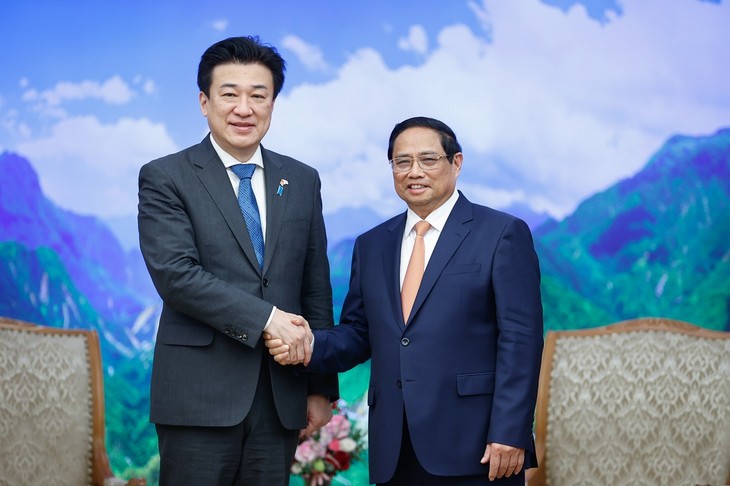(VOVWORLD) - Vietnam values and wishes to work with Japan to effectively and substantively realise their Comprehensive Strategic Partnership for Peace and Prosperity in Asia and the World, Prime Minister Pham Minh Chinh told Japanese Minister of Defence Kihara Minoru during a reception in Hanoi on Tuesday.
 Prime Minister Pham Minh Chinh receives Japanese Minister of Defence Kihara Minoru in Hanoi on August 6, 2024. (Photo: VGP/Nhat Bac) Prime Minister Pham Minh Chinh receives Japanese Minister of Defence Kihara Minoru in Hanoi on August 6, 2024. (Photo: VGP/Nhat Bac) |
He proposed that the two countries promote the exchange of all-level delegations and high-quality Japanese investment in Vietnam, accompanied by technology transfer, management capacity building, and human resources training.
Mr. Chinh called for greater efforts to enhance economic connectivity, increase bilateral trade, facilitate the export of Vietnamese agricultural products to the Japanese market, and advance new-generation ODA cooperation focusing on major and key projects.
Cooperation should also extend to new fields such as semiconductor chips and artificial intelligence, he said, stressing the importance of strengthening vocational training, labour cooperation and supporting the Vietnamese community in Japan. He also called for the promotion of cultural and sports exchanges, and collaboration in addressing issues such as population and development, resource depletion, digital transformation and green transition.
Hailing defence cooperation as a crucial pillar in bilateral relations, PM Chinh requested that both defence ministries continue fostering joint work in human resources training, technology transfer, equipment support, cybersecurity, and partnership between defence enterprises.
Minister Kihara said that his visit aims to further strengthen the Vietnam-Japan comprehensive strategic partnership and defence collaboration in areas of shared interest.
The two sides underscored the importance of ensuring security, safety and freedom of navigation and overflight in the East Sea, and settling all disputes through peaceful means in accordance with international law, especially the United Nations Charter and the 1982 United Nations Convention on the Law of the Sea (UNCLOS).